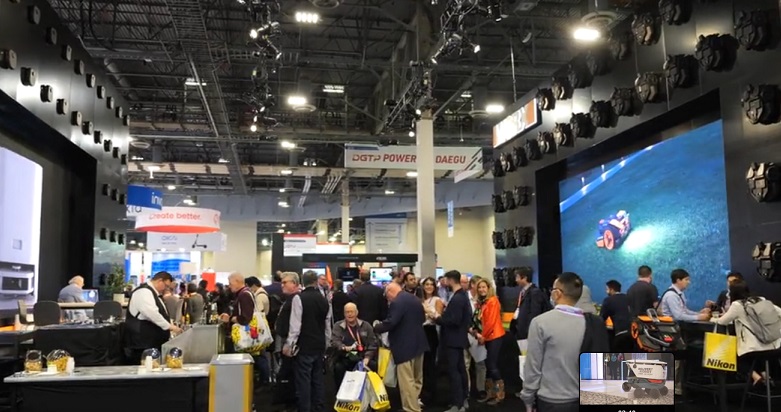Much of what has been written about the metaverse in 2022 centered around two words: failure and bust. Yet it appears that many of the 100,000 attendees and presenters at the CES 2023 consumer electronics show in Last Vegas this week hold a different view.
From the industry research released this week by the Consumer Technology Association to standing room-only metaverse sessions at the conference, the message was hard to miss: The metaverse, a shared, immersive 3D visual digital space to experience life as an alternative to the physical world, is coming and the enterprise will be a key driver.
“What the metaverse really represents is the next generation of the internet,” Steve Koenig, vice president of research for the Consumer Technology Association, said in a CES presentation on Tuesday, echoing the sentiment of Meta Platforms Inc. Chief Executive Mark Zuckerberg. “This is Web3 in a much more interactive and compelling experience. The metaverse is closer than you think. Make no mistake, this is a real trend.”
Rising interest
What’s making the metaverse more real is a notable rise in interest among both consumers and businesses for metaverse use cases. Earlier this week, Accenture PLC released research findings during CES that showed more than half of consumers surveyed view the metaverse as a business opportunity and 88% of C-suite executives believe the metaverse will have an important role in their organizations’ future growth.
“The majority of consumers want to live some part of their life in the metaverse,” Kevan Yalowitz, software and platforms industry lead at Accenture, said in an interview with SiliconANGLE. “We think that’s a pretty notable data point.”
Another notable data point is 150,000. That’s how many new Accenture employees were onboarded during the pandemic through the use of virtual reality headsets, according to Yalowitz.
“There’s a real desire to do other specific things in the metaverse, and there seems to be a willingness now to explore VR headsets,” Yalowitz noted. “We believe that if this were to hit scale broadly in the enterprise, it will trickle over into consumers.”
Enterprise value
One example of how enterprises are gravitating toward the metaverse can be seen in the transformation of Magic Leap Inc. The 13-year-old company has struggled to deliver a transformative VR product despite a total of $3.5 billion in funding. Former Qualcomm Inc. and Microsoft Corp. executive Peggy Johnson took over as CEO in 2020, and Magic Leap pivoted to an immersive augmented reality device tailored for the enterprise market.
In a sign of the metaverse’s growing role in the tech world’s agenda, Johnson joined Advanced Micro Devices Inc. CEO Lisa Su on the CES keynote stage Wednesday evening to highlight use of the chipmaker’s custom processor in advanced augmented reality systems for industrial and healthcare use cases.
“Enterprise is where the value is today,” Johnson said during an appearance at a CES metaverse panel session Thursday. “We need enterprises first and ultimately consumers to understand what this technology can do.”
Metaverse adoption is already beginning to transform industrial manufacturing. The use of digital twins to simulate real-world objects such as factory floors or aircraft engines is being driven by Siemens AB, the multinational German industrial manufacturing company.
“Customers over the years have been using the digital twin to define products faster and manufacture them better,” said Dale Tutt, vice president of industry strategy at Siemens Digital Industries. “As customers are starting to move into the metaverse and explore it, it’s been an extension of what they are doing already.”
Healthcare tool
The application of metaverse tools to existing practices is also making inroads in the healthcare industry. Osso VR, for example, provides a surgical platform that offers healthcare professionals a way to leverage immersive tools for important training. VR is emerging as a resource for surgical education.
“We know that an increased volume of surgery decreases complications,” Dr. Cory Calendine, orthopedic surgeon and founding partner at the Bone and Joint Institute of Tennessee and member of the advisory board at Osso VR, told SiliconANGLE. “VR is such a genuine authentic way to experience the operating world. It’s decreasing the cognitive load for the surgeon.”
As with much of the enterprise world, one of the key factors propelling the metaverse forward is growing influence and adoption of artificial intelligence. The metaverse represents a blending of multiple technologies, from AR and VR to 3D modeling, 5G, spatial and edge computing, and Web3 tools such as the blockchain.
“The interest in the metaverse is because it’s bringing together multiple disruptive technologies,” Neil Trevett, vice president of developer ecosystems at Nvidia Corp., said during a panel discussion at CES on Thursday. “The magic pixie dust is AI.”
Touchcast Inc. is a virtual events platform powered by artificial intelligence. On the show floor at CES this week, Touchcast and Microsoft unveiled the Fiat Metaverse Store, a virtual automotive showroom where customers can experience, configure and even purchase the new 500 La Prima by Bocelli car.
“AI and machine learning are starting to bring a look that feels authentic,” Jason Waskey, principal creative director at Microsoft, said during a metaverse track session. “How are we going to be able to integrate authentic human presences into this experience?”
Leveraging business opportunity
The answer to Waskey’s question may lie in our pockets. Major enterprise technology players have begun experimenting with augmented reality applications for mobile platform users. Telstra Corp., Google LLC and Accenture PLC have collaborated on a 5G-powered AR wayfinding experience that helps attendees at Australia’s Marvel Stadium locate their seats. Last month, Google staged virtual concerts in New York’s Times Square and London’s Piccadilly Circus featuring the Gorillaz virtual band and accessed via mobile devices.
“When you get all of these technologies all together, interesting stuff is going to happen,” said Trevett. “It will just gradually creep into our lives and create a way for business opportunity.”
The development of business opportunities surrounding the metaverse will be worth watching in 2023. While major enterprise players such as Google and Microsoft showcased metaverse tools at CES this week, market opportunities are nurturing a growing ecosystem of companies who are building for the space. One of these is the Futures Intelligence Group, a metaverse consultancy that was acquired by Journey Corporate Holdings only 10 months after its founding.
Futures Intelligence was led by former Amazon Web Services Inc. and Magic Leap executive Cathy Hackl, who is now Journey’s chief metaverse officer. Journey works with top brands on metaverse strategies and virtual fashion, with a continuing focus on bridging the digital world with physical reality.
“We believe the physical world is part of the metaverse, it just hasn’t been fully enabled,” Hackl said during a panel discussion at CES on Wednesday. “In the metaverse we are all world builders and now is our time to build.”
Photo: Consumer Technology Association
Show your support for our mission by joining our Cube Club and Cube Event Community of experts. Join the community that includes Amazon Web Services and Amazon.com CEO Andy Jassy, Dell Technologies founder and CEO Michael Dell, Intel CEO Pat Gelsinger and many more luminaries and experts.
Read More: news.google.com









 Bitcoin
Bitcoin  Ethereum
Ethereum  Tether
Tether  XRP
XRP  Solana
Solana  Dogecoin
Dogecoin  USDC
USDC  Cardano
Cardano  Lido Staked Ether
Lido Staked Ether  TRON
TRON  Avalanche
Avalanche  Sui
Sui  Wrapped stETH
Wrapped stETH  Toncoin
Toncoin  Shiba Inu
Shiba Inu  Chainlink
Chainlink  Wrapped Bitcoin
Wrapped Bitcoin  Stellar
Stellar  Hedera
Hedera  Polkadot
Polkadot  WETH
WETH  Bitcoin Cash
Bitcoin Cash  LEO Token
LEO Token  Litecoin
Litecoin  Uniswap
Uniswap  Pepe
Pepe  Hyperliquid
Hyperliquid  Wrapped eETH
Wrapped eETH  NEAR Protocol
NEAR Protocol  Ethena USDe
Ethena USDe  USDS
USDS  Internet Computer
Internet Computer  Aptos
Aptos  Aave
Aave  Mantle
Mantle  POL (ex-MATIC)
POL (ex-MATIC)  MANTRA
MANTRA  Cronos
Cronos  Ethereum Classic
Ethereum Classic  Render
Render  Bittensor
Bittensor  Monero
Monero  Tokenize Xchange
Tokenize Xchange  Artificial Superintelligence Alliance
Artificial Superintelligence Alliance  Dai
Dai  Virtuals Protocol
Virtuals Protocol  Arbitrum
Arbitrum